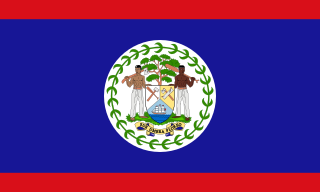
Belize is a Caribbean country on the northeastern coast of Central America. It borders Mexico to the north, the Caribbean Sea to the east, and Guatemala to the west and south. It has an area of 22,970 square kilometres (8,867 sq mi) and a population of 397,621 (2020). Its mainland is about 290 km (180 mi) long and 110 km (68 mi) wide. It is the least populated and least densely populated country in Central America. Its population growth rate of 1.87% per year is the second-highest in the region and one of the highest in the Western Hemisphere. Its capital is Belmopan, and its largest city is the namesake city of Belize City.

Nim Li Punit is a Maya Classic Period site in the Toledo District of the nation of Belize, located 50 kilometres north of the town of Punta Gorda, and directly adjacent to the village of Indian Creek. Nim Li Punit is sometimes known as Big Hat or Top Hat; the name is Kekchi Maya for "Big Hat", referring to the large elaborate head-dress on a stela sculpture found on site depicting one of the site's ancient kings. It is bordered by the Maya Mountains to the west and lowland swamps and the Caribbean Sea to the east.

"Land of the Free" is the national anthem of Belize. The words were written by Samuel Alfred Haynes and the music by Selwyn Walford Young in 1963. It was officially adopted in 1981.
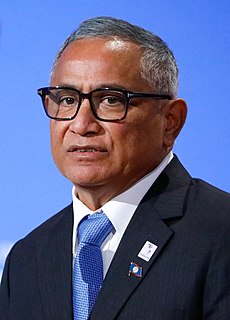
John Antonio Briceño is a Belizean politician who is the 5th and current Prime Minister of Belize since 12 November 2020, and the leader of the People's United Party (PUP) since 2016. He was Leader of the Opposition from 2008 to 2011 and from 2016 to 2020. From 1998 to 2007, he served as Deputy Prime Minister under Prime Minister Said Musa.

The Belizean–Guatemalan territorial dispute is an unresolved territorial dispute between the states of Belize and Guatemala, neighbours in Central America. During the late 1600s and throughout the 1700s, Britain and Spain signed several treaties regarding territories in the Americas. Both nations agreed that the territory was under Spanish sovereignty, but English settlers could use the land, in specific areas and for specific purposes. However, the area was never fully under British or Spanish occupation at this time. When the Spanish Empire fell, Guatemala said that they inherited Spain's sovereign rights over the territory. Since independence, Guatemala has claimed, in whole or in part, the territory of Belize.

Since declaring independence in 1981, Belize has enacted many environmental protection laws aimed at the preservation of the country's natural and cultural heritage, as well as its wealth of natural resources. These acts have established a number of different types of protected areas, with each category having its own set of regulations dictating public access, resource extraction, land use and ownership.
Prostitution in Belize is legal, but the buying of sexual services is not. Associated activities such as operating a brothel, loitering for the purposes of prostitution and soliciting sex are also illegal.

Tourism in Belize has grown considerably recently, and it is now the second largest industry in the nation. Belizean Prime Minister Dean Barrow has stated his intention to use tourism to combat poverty throughout the country. The growth in tourism has positively affected the agricultural, commercial, and finance industries, as well as the construction industry. The results for Belize's tourism-driven economy have been significant, with the nation welcoming almost one million tourists in a calendar year for the first time in its history in 2012.
EcoLogic Development Fund (EcoLogic), a 501(c)3 nonprofit organization based in Cambridge, Massachusetts, in the United States, advances conservation of critical natural resources in rural Latin America by promoting sustainable livelihoods and strengthening community participation in environmental stewardship. EcoLogic was established to fulfill a mandate voiced by indigenous and environmental leaders at the 1992 Earth Summit to reduce the destruction of significant tropical ecosystems by advancing economic development and self-determination among communities living in and around threatened habitats. EcoLogic partners with local organizations to promote community-based management of forests and coastal ecosystems, often at the level of microwatersheds; direct water sources and the land cover that helps recharge and clean the water. Since 1993, EcoLogic has provided direct technical and financial assistance to over 5,000 rural communities and has helped to protect 2,000 water sources throughout Latin America.
Elvin Penner is a Belizean politician who served in the House of Representatives from 2008 to 2015 representing the Cayo North East constituency. He is a member of the United Democratic Party. Penner was the first Belizean Mennonite elected to national office.
Sarstoon-Temash is the southernmost national park in Belize. The national park was designated in 1994, and covers an area of 165.92 km2. It is managed by the Sarstoon Temash Institute for Indigenous Management (SATIIM), in partnership with the Forest Department.
Samuel Lungole Awich is a Commonwealth jurist, whose career has taken him from his native Uganda to Botswana, the Solomon Islands, and for the past decade Belize.
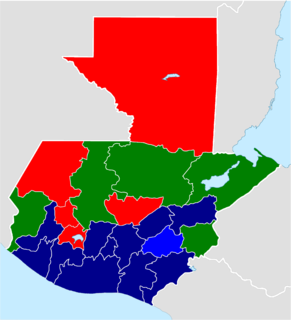
General elections were held in Guatemala on 6 September 2015 to elect the President and Vice President, all 158 Congress deputies, all 20 deputies to the Central American Parliament, and mayors and councils for all 338 municipalities in the country.
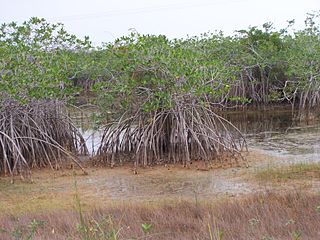
The Belizean Coast mangroves ecoregion covers the brackish and salt-water habitats along the Caribbean Sea coast of Belize, and of Amatique Bay in Guatemala. Small portions of Mexico are also in this region. The mangroves are partially protected from the open sea by the Belize Barrier Reef, and this ecoregion is distinct from the reef-based Belizean Reef mangroves ecoregion offshore. There is a large population of the vulnerable West Indian manatee in the area. It covers an area of around 2850 km2.
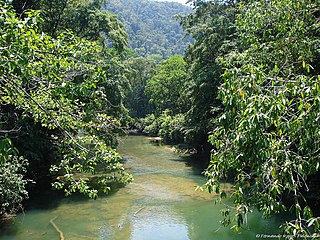
The 2016 Belize–Guatemala border standoff began when Belizean soldiers fatally shot a 13-year-old Guatemalan in the Cebada area of the Chiquibul National Park in western Belize with Guatemala.
Julio René AlvaradoRuano was a fourteen-year-old Guatemalan male who was killed in the Belize–Guatemala adjacency zone during an armed confrontation between the Belize Defence Force, Belizean park rangers, and Guatemalan farmers. The incident raised tensions between Belize and Guatemala, who have an ongoing border dispute since 1821. Belizean officials maintain that the Belize Defence Force acted in self-defence. However, the Guatemalan government claims the incident was a deliberate attack carried out by Belize's military. After the incident, the Organisation of American States agreed to investigate the death of Julio Alvarado at the request of both countries.
The Billy Barquedier National Park is a national park in Belize, located between 16.5–19 miles on the Hummingbird Highway in Stann Creek District, south of Belize City. It is located between the Mullins River and Stann Creek watersheds.
Cristina Coc is a leader of the Maya community in southern Belize. She has served as co-spokesperson for the Maya Leadership Alliance and is the founder and executive director of the advocacy organization, the Julian Cho Society. In 2015, she and the MLA were awarded the Equator Prize for their efforts in protecting indigenous rights.
A referendum on the territorial dispute with Belize was held in Guatemala on Sunday 15 April 2018. Voters were asked whether the Guatemalan government should request the International Court of Justice to resolve the territorial dispute permanently, as part of a commitment signed in December 2008 between Guatemala and Belize. Guatemalan Vice President, Jafeth Cabrera, stated that Belize would hold their referendum in response in May 2018, but Belize released a statement denying that and stating rather that it would hold the referendum after the re-registration process has occurred to ensure an accurate and fair vote.











